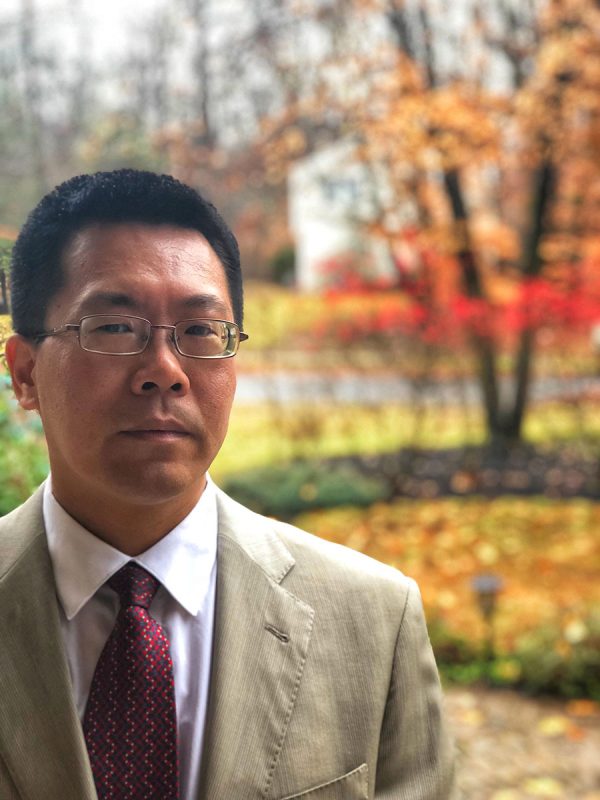In Teng Biao’s own words, he smiles because he is “fighting for human dignity and freedom”. It isn’t something many people say, but fighting for freedom is something Biao has dedicated his life to. A lawyer by trade, Biao has been fighting for human rights in China for decades. As a young college student, Biao realized just how difficult it was to find information and facts about his country of birth. It helped drive him to discover the truth about China, and once he did, he began trying to help those being negatively affected by the country’s government.
The lawyer turned human rights activist has been a vocal opponent of the Chinese government. It has landed him in hot water with the Chinese Communist Party. But Biao hasn’t stopped his fight against a government he has labeled as totalitarian.
Biao recently sat down to speak with Totalprestige Magazine about China and the human rights situation going on inside the country. It was a truly eye-opening interview.
Mr. Teng Biao, you are one of the foremost human rights activists when it comes to Chinese politics and government. Can you explain when and how you got started with the human rights movement in China?
I was born into a poor family in a remote village in northeast China. When I was in elementary school, middle school, and high school, I was heavily brainwashed like most other students. I never had the chance to access a book or a teacher that was critical of the Chinese government. I then entered Peking University, the No. 1 university in China, and fortunately, met few professors who encouraged me to think critically and independently. I gradually came to realize that I had always been lied to by teachers, textbooks, and government propaganda. I saw more and more human rights abuses and injustice. I felt ashamed that China is still under the one-party rule which is against all human values. For over a century, from the Chinese Revolution of 1911 to the May 19 Movement of 1957, from the Xidan Democracy Wall of 1978 to the Democracy Movement of 1989, the Chinese people have never ceased in their struggle for democracy. Many had dedicated their lives to the freedom cause before I started my human rights activities, and I was eager to be part of their heroic fight.
Many people see the rise in money and the financial strength of China currently. It seems to blind people from what is truly happening. How desperate is the human rights situation in the country?
When you go to China, you will see skyscrapers, spacious streets, luxury shopping malls, and high-speed railway. People admire the Chinese economic miracle and the “Chinese model.” But, if you look closely, you can see the real picture –a picture full of grievance, tears, poverty, corruption, pollution, torture, and concentration camps.
Tens of thousands of human rights defenders, lawyers, dissidents, bloggers, and journalists have been thrown into prisons. Political prisoners have died in custody, including the Nobel Laureate Liu Xiaobo. Family members of rights activists are targeted. Rights NGOs are shut down. People living in China cannot have access to Google, Facebook, Twitter, or YouTube. Torture, enforced disappearance, forced eviction, and miscarriage of justice are rampant. Since 1999, more than 4,000 Falun Gong practitioners have been tortured to death in custody. One Hundred and fifty-three Tibetans have committed self-immolation to protest the persecution against them. Demolishing churches, burning Bibles, sending Uighurs and ethnic minorities to concentration camps by the million in Xinjiang are just a few of the examples of the deteriorating human rights situation behind the gorgeous appearance of the “China miracle.”
You are the founder of the China Against the Death Penalty (CADP) group. Can you tell us about the organization and how prevalent capital punishment is in China?
While I was practicing law in China, I got involved in many death penalty cases. Through these cases, I found that many people were wrongfully convicted. In 2007, I was invited to participate in the World Congress Against the Death Penalty. I began to understand the work of the abolitionists around the world. I decided to set up an NGO aiming to end the death penalty in China. In 2010, I founded CADP, the first and only abolitionist NGO in China.
Because all statistics related to the death penalty in China are classified as state secrets, one can only estimate the number of deaths and death sentences. According to Amnesty International, China carries out at least 1,000 executions each year. However, I told them that this was far below the real figure. Based on all the information that I had gathered and my own experience as a criminal defense lawyer, I had come to the conclusion that China performed at least 11,000 executions per year before the year of 2007 and at least 6,000 per year after 2007.
Due to the large number of death sentences in China, CADP can only focus on some special types of such cases, mainly the wrongful convictions. There are loopholes in China’s judicial system, and many innocent people have been sentenced to death. Correcting such injustice is extremely arduous. Yet, since 2010, CADP has successfully helped at least nine innocent Chinese citizens to be released from death row.
There are many people all over the world who believe the death penalty is an important punishment for criminals. Can you further explain the importance of ending such an archaic form of punishment?
Many people support the retention of the death penalty because they believe that it can deter criminals. However, numerous studies have shown that compared with life imprisonment, a death penalty does not even have marginal effect to deter crimes.
It is not right to kill. A citizen should not kill another, nor should a state kill a citizen—not even in the name of enforcing laws. Life and death should not be treated as a means, but as an end. Any kind of execution is painful and inhumane.
But here is the most important reason that I have for changing some people’s stance on this matter. No criminal justice or judicial system is perfect. Human beings are prone to mistakes, including the lawmakers, police, witnesses, prosecutors, lawyers, judges and jurors. So, it is possible and it has happened in every single jurisdiction that people were mistakenly sentenced to death. And unlike other kinds of penalties, the consequence of the death penalty cannot be reversed. You cannot take back a life after execution. You cannot even make a meaningful remedy for that.
In 2003, you helped found the Open Constitution initiative. Its creation angered government officials. What is the Open Constitution Initiative and why is it so controversial to members of the government?
The Chinese name of the Open Constitution Initiative is Gongmeng. By operating Gongmeng, we dealt with a lot of human rights issues. We pushed the envelope and became one of the most dangerous organizations in China. Gongmeng’s participation in the human rights movement was quite wide-ranging, focusing on petitioners’ rights, public interest litigation, lawyers’ rights, freedom of expression, tainted milk powder and other public health incidents, promoting reform to the household registration (hukou) system, and demanding equal access to education, among other issues. We encouraged people to participate in the local elections as independent candidates, while all the elections in China are immensely manipulated by the Chinese Communist Party (CCP). We published a report on the 2008 Tibetan unrest after a series of investigations. All these things were very sensitive in China. Gongmeng enraged the Chinese government so much that it was shut down in 2009 and our executive director was detained.
Has there been a “brainwashing” of Chinese citizens that has wiped their memories of incidents like Tiananmen Square and other rights infringements?
CCP’s brainwashing and propaganda are generally effective. “Who controls the past controls the future” (George Orwell). CCP has successfully controlled the past, by fabricating history, monopolizing media and education, strengthening censorship, and punishing dissidents, truth tellers, and critical ideas. People are afraid to talk about the Tiananmen massacre, because it will bring them big trouble. Gradually, people choose to forget it because the memory of it would only bring pain and moral anxiety. For the people who did not experience Tiananmen, they have little chance to know anything about it from media, books, Internet, or even daily conversations. Similarly, a vast majority of Chinese people do not know about Tibetan self-immolations, the persecution of Falun Gong, or Xinjiang concentration camps. Most people can only echo the official propaganda, though it seems that they are expressing their own opinions.
Is China’s problem also a global one in the way that people are generally indifferent to the government unless it directly affects them?
Yes and no. Political indifference can be found everywhere, so can consumerism, cynicism, materialism, and opportunists.
But China’s fundamental problem is the lack of freedom of expression, freedom of association, and the right to vote. Chinese people are indifferent mainly because they have been deprived of the rights to discuss and participate in politics. There are brave dissidents and activists, taking the risk to promote human rights and democracy in China, but they are either in prison or on the way to prison.
A society will be tremendously harmed if its people do not take their civil responsibilities. Because democracy and freedom should not be taken for granted, they need to be explored, nourished, and protected, profoundly and continuously.
You have said China is moving more and more into an Orwellian state. How is this happening?
The CCP established a totalitarian state in 1949, which surpassed the Third Reich as to the total control of society and the private sphere. After Mao died in 1976, especially after China adopted the “socialist market economy” in early 1990s, most China scholars in the west regarded China as an authoritarian state. But it is not. It is still a totalitarianism, a “sophisticated totalitarianism.” This totalitarianism is strict and refined without being brittle and dogmatic; it is cruel and barbaric without being chaotic. China’s booming economy, social stability, and the apparent public support for CCP leaders have fooled both the world and most Chinese citizens.
China’s “high-tech totalitarianism” has begun to take shape. The CCP utilizes its lead inartificial intelligence to tighten its total control of the Chinese society. China’s Great Firewall, social media, big data, E-commerce and modern telecommunication make it easier for the CCP to keep people under a surveillance akin to Bentham’s panopticon, in which nobody knows if or when they are being watched, but it is always a possibility. The internet has been used by the CCP as an effective tool for censorship, propaganda, and brainwashing. Facial recognition, voiceprint recognition, gait recognition, DNA collection, and biometric tags have all systematized the CCP’s growing control. In Shandong province, virtual reality(VR)was used to test Party members’ level of loyalty to the Party. Market research firm IDC recently predicted that China’s public surveillance camera network will keep growing, with a total of 2.76 billion units installed by 2022. For every Chinese citizen, there will then be two surveillance cameras, not counting those on their personal devices that can be digitally commandeered at any time by the CCP. Thinking about China’s networked stability maintenance, social credit system, secret police, state stoking of nationalist sentiment, expanded control of the media and Internet, mass arrests of rights activists, and cult of personality around Xi Xinping, what we have seen in China is an unprecedented high-technology totalitarianism, an advanced version of Orwell’s 1984.
Moreover, China has become more and more powerful and aggressive on the international stage. This hi-tech Orwellian state will become an increasingly urgent threat to universal values and the world as a whole.
What can the outside world do to help the human rights situation in China?
In the past decades, international media and human rights organizations have made great efforts to raise the human rights issues in the world, and they will continue to play an important role in improving human rights and the rule of law in China. But in general, since 1989 or earlier, western governments adopted an engagement policy with China that pay less attention to human rights than to business. This kind of engagement policy is similar to the appeasement policy in practice. Some western companies have even become accomplices of Chinese government’s abuse of power, such as providing technology and trainings to strengthen China’s GFW (Great Firewall), and providing clients’ information to China’s state security to convict Chinese bloggers.
So, the first thing that can help human rights in China is to stop the appeasement policy and to stop prioritizing business over human rights.
If the situation continues with DNA collecting, mass prisons and death sentencing broadcasts on social media, and other human rights infringements, where do you believe China will be in 10 years?
There are some major elements that impact China’s political changes, including potential economic crisis, widespread public dissatisfaction, ideological decline, internal power struggles, and geopolitical change. What Xi Jinping and CCP have been doing is only adding the political uncertainty, which makes it harder to predict the near future. If the CCP still rules China in 10 years, it will be a disaster, not only to the Chinese people, but also to the whole world. What is even more terrible to me is that even if the CCP is overthrown in 10 years or more, the social decay, moral turpitude, and ethnic hatred accumulated under the brutal dictatorship of CCP would likely bring huge barriers and risks to the political transition.
Teng, what is a day in your life like?
I’m always busy. I get up early, reading, writing, checking emails, updating my Twitter and Facebook, taking interviews, keeping in touch with activists in China, working with seven human rights NGOs of which I am a board member. I travel frequently, attending conferences, workshops, and giving talks. I do exercise, listen to music, practice my Chinese calligraphy, watch movies, take care of my children, play with them, and help them learn.
What is something most people don’t know about you?
I enjoy writing poems and novels. Actually, my dream is to finish a few plays and novels that I have been thinking about for years.
What makes you smile?
I always smile in my deep heart. I can feel that my life is meaningful and abundant, being connected with the history, society, or the universe. I feel I am loved and blessed. The fact that I am fighting for human dignity and freedom, always makes me smile.
What scares you?
I believe in love, freedom, and justice. But many people around me do not love, do not think, do not believe in anything. They distort the facts and care for nothing but his or her own vulgar enjoyment. The widespread thoughtlessness could potentially destroy human civilization. That scares me, but I try my best to conquer my frustration.
Do you have any hobbies?
Movies, plays, music, traveling, photography, Chinese calligraphy, reading, writing, Lego, flea markets, and others.
Which historical figure do you most admire?
Vaclav Havel. He was a playwright, writer, and political dissident in the communism-ruled Czechoslovakia. His analysis of a post-totalitarian society and civil responsibility, his call for “living in truth,” his fight for liberal democracy, and his extraordinary courage have greatly inspired me.
Can you share two of your favorite quotes with us?
“An unexamined life is not worth living.” – Socrates
“The secret to happiness is freedom… And the secret to freedom is courage.” – Thucydides
If you had the power to change just one thing in the world what would it be?
I will end the rule of the Chinese Communist Party. That will free the most populous country in the world and will help the collapse of other tyrants.
To find out more about Teng Biao and to stay up to date with his fight for human rights in China, please visit his Twitter at https://twitter.com/tengbiao.











